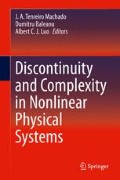Abstract
This chapter presents optimization of fractional order PI λ D μ control parameters by using response surface methodology. The optimization process is observed on a fractional order diffusion system subject to input hysteresis which is defined with Riemann–Liouville fractional derivative. The system is transferred to a fractional order state space model by using eigenfunction expansion method and then Grünwald–Letnikov approximation is applied to solve the system numerically. The necessary data for response surface analysis are read from the obtained numerical solution. Finally, second-order polynomial response surface mathematical model for the experimental design is presented and the optimum control parameters are predicted from this response surface model. The proposed optimization method is compared with the technique of minimization of integral square error by means of settling time and the results are discussed.
Access this chapter
Tax calculation will be finalised at checkout
Purchases are for personal use only
References
Agrawal OP (2004) A general formulation and solution scheme for fractional optimal control problems. Nonlinear Dyn 38:323–337
Agrawal OP, Defterli Ö, Baleanu D (2010) Fractional optimal control problems with several state and control variables. J Vib Control 16:1967–1976
Baleanu D, Defterli Ö, Agrawal OP (2009) A central difference numerical scheme for fractional optimal control problems. J Vib Control 15:583–597
Baleanu D, Diethelm K, Scalas E, Trujillo JJ (2012) Fractional calculus models and numerical methods. Series on complexity, nonlinearity and chaos. World Scientific, Singapore
Barbosa RS, Silva MF, Machado JAT (2009) Tuning and application of integer and fractional order PID controllers. Intell Eng Syst Comput Cybern 5:245–255
Box GEP, Wilson KB (1951) On the experimental attainment of optimum conditions. J R Stat Soc Series B 13:1–38
Cao JY, Liang J, Cao BG (2005) Optimization of fractional order PID controllers based on genetic algorithms. Proc Int Conf Mach Learn Cybern 9:5686–5689
Castillo ED (2007) Process optimization - a statistical approach. Springer, New York
Demirtaş M, Karaoglan AD (2012) Optimization of PI parameters for DSP-based permanent magnet brushless motor drive using response surface methodology. Energy Convers Manag 56:104–111
Efe MÖ (2010) Fractional order sliding mode controller design for fractional order dynamic systems. New Trends Nanotechnol Fract Calc Appl 5:463–470
Ekren O, Ekren BY (2008) Size optimization of a PV/wind hybrid energy conversion system with battery storage using response surface methodology. Appl Energy 85:1086–1101
Giesbrecht FG, Gumpertz ML (2004) Planning, construction, and statistical analysis of comparative experiments. Wiley, New Jersey
İskender BB, Özdemir N, Karaoglan AD (2012) Tuning of fractional order \({\mathit{PI\,}}^{\lambda }{D}^{\mu }\) controller with response surface methodology. In: Proceedings of IEEE 4th international conference on nonlinear science and complexity, pp 145–149, 6–11 August 2012
Lino P, Maione G (2007) New tuning rules for fractional PI α controllers. Nonlinear Dyn 49:251–257
Mason RL, Gunst RF, Hess JL (2003) Statistical design and analysis of experiments, 2nd edn. Wiley, New Jersey
Miller KS, Ross B (1993) An introduction to the fractional calculus and fractional differential equations. Wiley, New York
Montgomery DC (2005) Design and analysis of experiments: response surface method and designs. Wiley, New Jersey
Moradi MH, Johnson MA (2005) PID control. Springer, London
Oldham KB, Spanier J (1974) The fractional calculus. Academic, New York
Oustaloup A (1995) La Derivation Non Enteire. HERMES, Paris
Özdemir N, İskender BB (2010) Fractional order control of fractional diffusion systems subject to input hysteresis. J Comput Nonlinear Dyn 5:021002(1–5)
Özdemir N, Karadeniz D İskender BB (2009) Fractional optimal control problem of a distributed system in cylindrical coordinates. Phys Lett A 373:221–226
Podlubny I (1999) Fractional differential equations. Academic, San Diego
Podlubny I (1999) Fractional-order systems and \({\mathit{PI\,}}^{\lambda }{D}^{\mu }\) -controllers. IEEE Trans Automat Contr 44:208–214
Su CY, Stepanenko Y, Svoboda J, Leung TP (2000) Robust and adaptive control of a class of nonlinear systems with unknown backlash-like hysteresis. IEEE Trans Automat Contr 45:2427–2432
Valerio D, Costa JS (2006) Tuning of fractional PID controllers with Ziegler-Nichols-type rules. J Signal Process 86:2771–2784
Zhao C, Xue D, Chen YQ (2005) A fractional order PID tuning algorithm for a class of fractional order plants. In: Proceedings of the IEEE international conference on mechatronics & automation, Niagara Falls, vol 1, pp 216–221
Author information
Authors and Affiliations
Corresponding author
Editor information
Editors and Affiliations
Rights and permissions
Copyright information
© 2014 Springer International Publishing Switzerland
About this chapter
Cite this chapter
İskender, B.B., Özdemir, N., Karaoglan, A.D. (2014). Parameter Optimization of Fractional Order PI λ D μ Controller Using Response Surface Methodology. In: Machado, J., Baleanu, D., Luo, A. (eds) Discontinuity and Complexity in Nonlinear Physical Systems. Nonlinear Systems and Complexity, vol 6. Springer, Cham. https://doi.org/10.1007/978-3-319-01411-1_5
Download citation
DOI: https://doi.org/10.1007/978-3-319-01411-1_5
Published:
Publisher Name: Springer, Cham
Print ISBN: 978-3-319-01410-4
Online ISBN: 978-3-319-01411-1
eBook Packages: EngineeringEngineering (R0)

